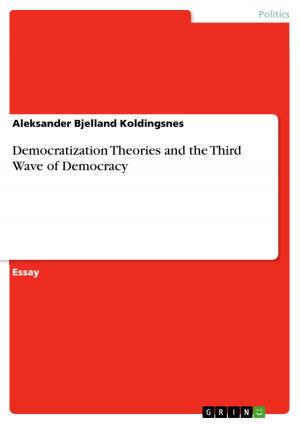European integration - Franco-German interests in the European Coal and Steel Community (ECSC)
Franco-German interests in the European Coal and Steel Community (ECSC)
Nonfiction, Social & Cultural Studies, Political Science| Author: | Daniel Döring | ISBN: | 9783638868341 |
| Publisher: | GRIN Verlag | Publication: | November 29, 2007 |
| Imprint: | GRIN Verlag | Language: | English |
| Author: | Daniel Döring |
| ISBN: | 9783638868341 |
| Publisher: | GRIN Verlag |
| Publication: | November 29, 2007 |
| Imprint: | GRIN Verlag |
| Language: | English |
Research Paper (undergraduate) from the year 2006 in the subject Politics - International Politics - Topic: European Union, grade: 1,8, The University of Sydney, 6 entries in the bibliography, language: English, abstract: With the 18.04.1951 ratified Schuman-Plan, one of the most important Contracts in European Integration has become valid. The European coal and steel community (ECSC) is overall seen as the first Milestone for the today known European Union (EU). This community was the first step towards the present European parliament, European commission, and the European court of justice. But there is the question, seen from the present point of view, if the Schuman-Plan was the birth of the European supranational community. Was this contract signed by the six nations out of idealistic goals, without any self-interest reasons to create a peaceful Europe? This question is admittedly very hard on the six nations that officially had idealistic reasons when they signed the ECSC Contract. But i will show that this project of a unified Europe was not Jean Monnet's only goal as it is stated in some present perspectives. On the next pages i will focus on the reasons why the war opponents Germany, France and the other nations were willing the take on this project together. Quoting Kipping's Work on the Schuman-Plan it is not certain if the plan was motivated more by economic or political reasons. Also it is disputed who the plan was developed by. On one side it is believed that all this was pressured by Jean Monnet and France. A different scenario states that the USA Interest was the empowerment of Germany, and that this was the real pressure behind the Schumann-Plan. A third one is a mix between the first two which states that the USA pressured the nations, but never directly intervened. Along with the controversy above, it is still unsure if peace or economic interests were the reasons for the teamwork of the six nations. At the beginning researchers believed that the main reasons were political and indirectly economical. At the beginning Schumann underlined the great security-political importance of the ECSC, as it stands for a unified Europe and reduced the risk of Germany going its own way in an unknown future. The economic interests by the nations developed later according to Kippings.
Research Paper (undergraduate) from the year 2006 in the subject Politics - International Politics - Topic: European Union, grade: 1,8, The University of Sydney, 6 entries in the bibliography, language: English, abstract: With the 18.04.1951 ratified Schuman-Plan, one of the most important Contracts in European Integration has become valid. The European coal and steel community (ECSC) is overall seen as the first Milestone for the today known European Union (EU). This community was the first step towards the present European parliament, European commission, and the European court of justice. But there is the question, seen from the present point of view, if the Schuman-Plan was the birth of the European supranational community. Was this contract signed by the six nations out of idealistic goals, without any self-interest reasons to create a peaceful Europe? This question is admittedly very hard on the six nations that officially had idealistic reasons when they signed the ECSC Contract. But i will show that this project of a unified Europe was not Jean Monnet's only goal as it is stated in some present perspectives. On the next pages i will focus on the reasons why the war opponents Germany, France and the other nations were willing the take on this project together. Quoting Kipping's Work on the Schuman-Plan it is not certain if the plan was motivated more by economic or political reasons. Also it is disputed who the plan was developed by. On one side it is believed that all this was pressured by Jean Monnet and France. A different scenario states that the USA Interest was the empowerment of Germany, and that this was the real pressure behind the Schumann-Plan. A third one is a mix between the first two which states that the USA pressured the nations, but never directly intervened. Along with the controversy above, it is still unsure if peace or economic interests were the reasons for the teamwork of the six nations. At the beginning researchers believed that the main reasons were political and indirectly economical. At the beginning Schumann underlined the great security-political importance of the ECSC, as it stands for a unified Europe and reduced the risk of Germany going its own way in an unknown future. The economic interests by the nations developed later according to Kippings.















